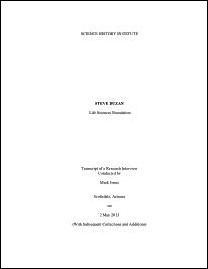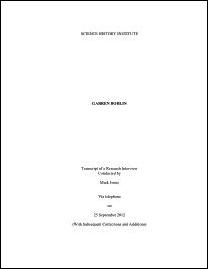Research Interview with John Crowley
- 2012-May-03
Research Interview with John Crowley
- 2012-May-03
John Crowley was born and raised in northern New Jersey. His father was a cop who died on duty when Crowley was seven years old. Later in his life, Crowley attended business school and became a consultant, moving to San Francisco, California. He married his wife Eileen in 1990, and the two had three children. His youngest two children began exhibiting symptoms of a neuromuscular disease and would later be diagnosed with Pompe disease. At the time, Crowley was working as a consultant for Bank of America but moved back to New Jersey with his wife and children to be around his family. He began working for Bristol-Myers and Company in a general management job position. His children’s condition worsened and access to treatments for Pompe disease was slow moving, motivating Crowley to leave his job and start a biotech company with Dr. William Canfield called Novazyme. He commuted to Oklahoma City, Oklahoma, from New Jersey every week. Novazyme’s research was dedicated entirely to Pompe disease treatment, and after raising twenty-seven million dollars in capital by June of 2001, Novazyme became a subsidiary of Genzyme. Crowley’s job entailed evaluating the Pompe programs and determining which would move forward. At the time, Crowley’s children did not qualify for Genzyme’s treatment program but were eventually accepted as their condition was caused by the same mutation. Crowley resigned as CEO so there would not be any conflicts of interest while his children received treatment. His children’s condition started to improve, and Crowley began working for Domain Associates. He later left to work for Amicus Therapeutics, becoming their CEO in January of 2005. In addition to researching therapeutic treatments for Pompe disease, Amicus also researched Fabry disease, Gaucher disease, and other lysosomal storage disorders. When Crowley joined Amicus, the company only had six employees; under his leadership, the staff grew to one hundred and thirty. Crowley’s dedication to advancing treatments for Pompe disease for his children was memorialized in Geeta Anand’s book The Cure: How a Father Raised $100 Million – And Bucked the Medical Establishment – In a Quest to Save His Children and the 2010 film Extraordinary Measures.
| Property | Value |
|---|---|
| Interviewer | |
| Interviewee | |
| Place of interview | |
| Format | |
| Genre | |
| Extent |
|
| Language | |
| Rights | Creative Commons Attribution-NonCommercial-NoDerivatives 4.0 International License |
| Credit line |
|
About the Interviewer
Brian Dick received his PhD in sociology from the University of California, Davis. Before coming to the Institute he was a research associate at the Life Sciences Foundation. His research interests include the history of agricultural biotechnology, the emergence of the biotech industry, and the Human Genome Project.
Institutional location
| Department | |
|---|---|
| Collection | |
| Oral history number | 0030 |
Related Items
Cite as
See our FAQ page to learn how to cite an oral history.
Complete transcript of interview
crowley_j_0030ri_updated_full.pdf
The published version of the transcript may diverge from the interview audio due to edits to the transcript made by staff of the Center for Oral History, often at the request of the interviewee, during the transcript review process.









